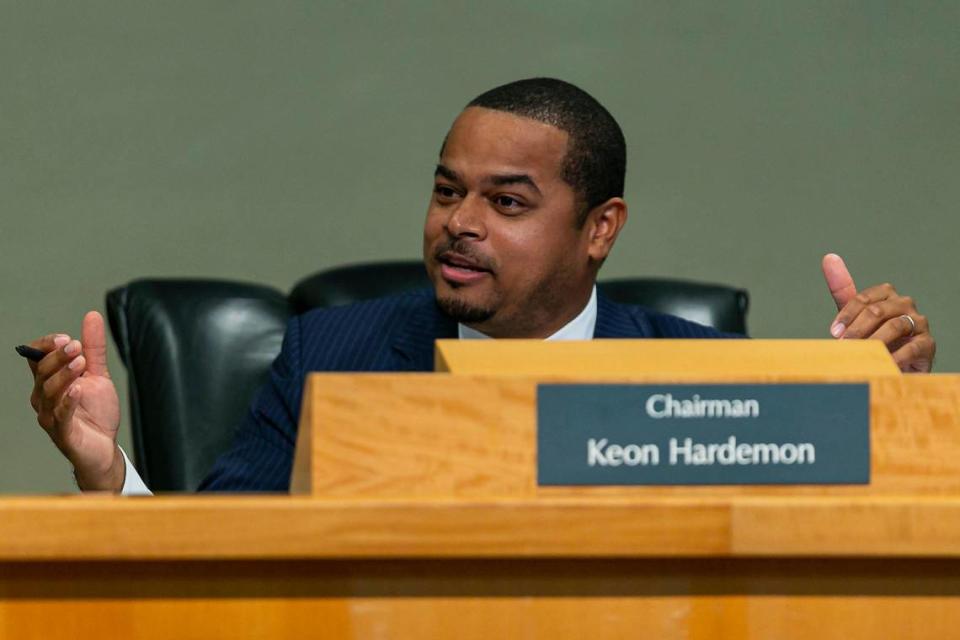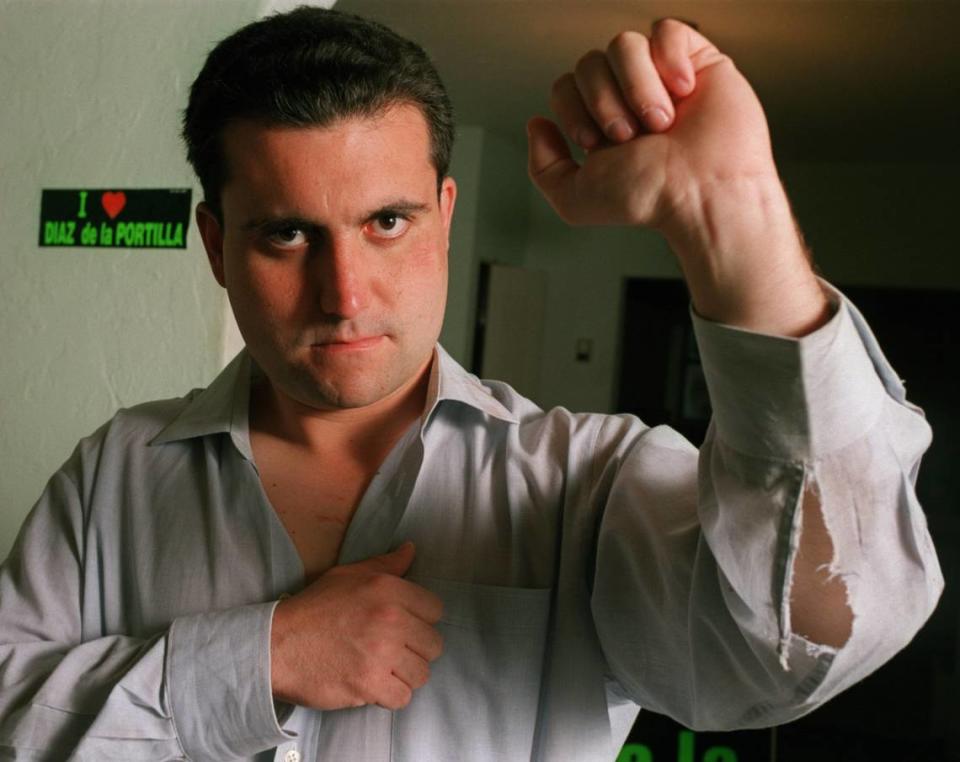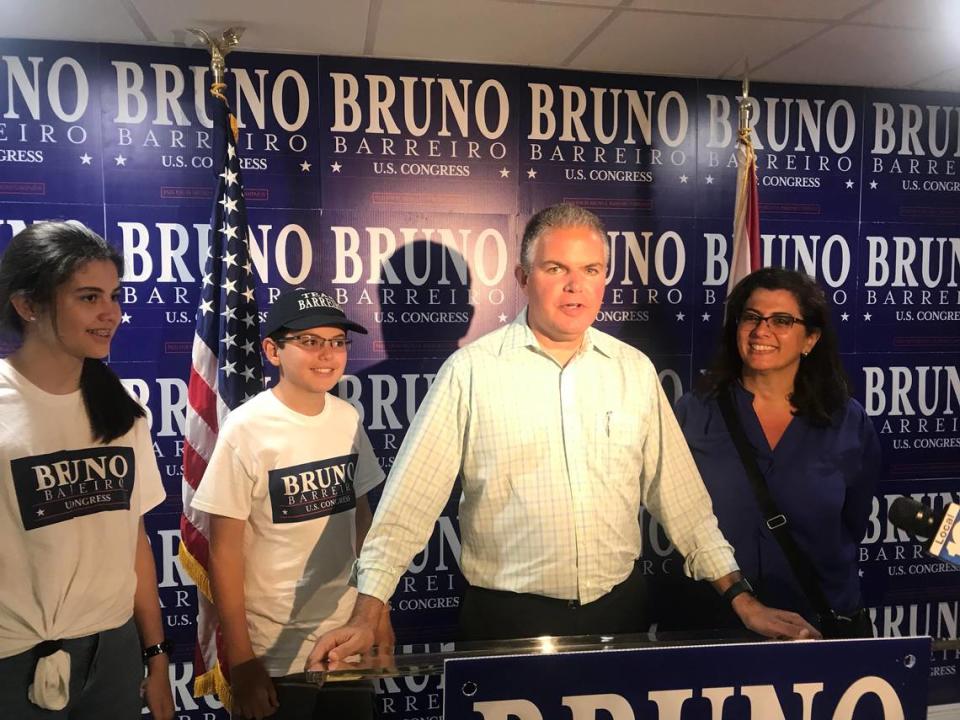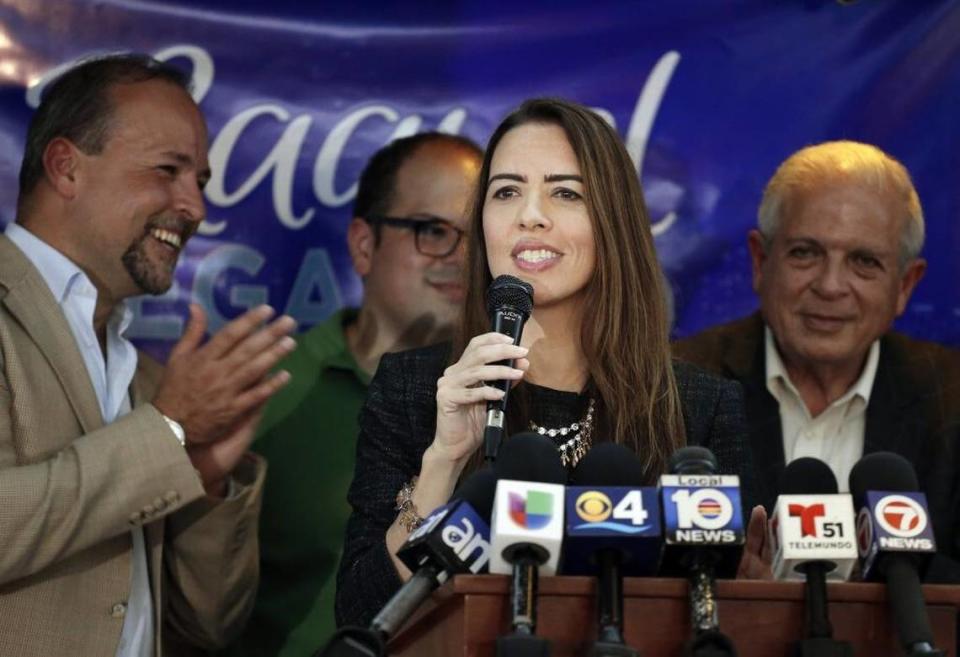‘Unprecedented’ power. Miami’s political families seek office in August election.
The names on the Aug. 18 ballot need little introduction. Suarez. Hardemon. Barreiro. Regalado. Diaz de la Portilla.
This summer, Miami’s political dynasties — families that for decades have sought and held office from Dinner Key to Washington, D.C. — are again jockeying for power. Some are attempting to win their way back from voter-imposed exile. Others are hoping to expand their influence.
And in a new twist that may represent the apex of Miami’s Game of Thrones, a father and son are hoping to become perhaps the most powerful political duo in South Florida history by stamping one surname on two of the top offices in the county.
“It’s fascinating to see,” said Paul George, resident historian at the HistoryMiami museum. “It would be unprecedented.”
But as County Commissioner Xavier Suarez seeks to become county mayor — in a campaign that heavily features his son, Miami Mayor Francis Suarez — it’s unclear if the dynastic pitch is a plus when it comes to voters.
“The notion that Miami is ruled by one family in perpetuity is coming to an end,” said Christian Ulvert, a campaign consultant running several campaigns this summer against members of Miami’s well-known political families, including Xavier Suarez. “Not because of candidates challenging them but because voters are tired of it.”
Xavier Suarez’s campaign for county mayor could test whether that’s true. Far from shy about the extent to which his ascension could also empower his son, the elder Suarez is using the potential consolidation of power as a selling point to voters in a competitive race with three other contenders ahead of him in polls.
“Two generations of leaders,” reads a billboard featuring father and son, paid for by Xavier Suarez’s political committee.
The elder Suarez has also included his son — who is not on the ballot — in some of his ads, including a TV commercial and a robocall.
“He’s athletic. He’s charismatic. He’s very popular right now,” Xavier Suarez said of his son. “Our [polling] numbers are actually pretty close to the same, countywide. If he wasn’t, I wouldn’t use him.”

The elder Suarez became the first Cuban-born mayor of the city of Miami in 1985 — the first of two stints as mayor — and after 13 years out of power won his way back into elected office in 2011 by winning the county commission seat he still occupies. His son, who was first elected as a Miami city commissioner in 2009 and won a four-year stint as city mayor in 2017, is an integral part of his father’s latest campaign, acting as something of an unofficial running mate and also raising money for his father.
“One of my biggest events was at his house,” Suarez said of a late January fundraiser at his son’s home in Miami. “I did most of the work on it. But going to the house of the mayor of the city is a nice thing for people to do.”
The Suarezes might make history again with a successful campaign in the county mayor’s race — though it’s likely to go to a runoff in the November election — but they are hardly the only Miami political family attempting to expand their influence.
Miami City Commissioner Keon Hardemon is leaving his seat a year early to run for a county commission district representing parts of Overtown, downtown Miami, Little Haiti and Liberty City. His uncle, Roy Hardemon, a former Democrat state representative, is running to reclaim his seat representing some of those same neighborhoods. And Roy Hardemon’s daughter, Monique Nicole Barley, is running for county mayor.

Nor is the familial phenomenon new in Miami politics.
One of Miami’s first mayors, John Sewell, was succeeded 20 years after leaving office in 1907 by his brother, E.G. Sewell, who’d go on to serve two more stints as mayor of the city, the last ending in 1940 upon his death. He was immediately succeeded by Alexander Orr, whose nephew, Jack Orr Jr. became county mayor in 1972. Orr was county mayor for two years before he died of cancer while in office in 1974 — the same year his brother, George Orr, was elected circuit judge.
Other modern day political clans exist, as well. In Miami Beach, Dan Gelber followed his father — former Miami Beach Mayor Seymour Gelber — as the city’s elected mayor in 2017. One county to the north, the Geller brothers, Joe and Steve, currently occupy positions in the state House and on the Broward County Commission.
“We’ve seen a lot of this,” said George, the Miami historian.
But over the years, Miami has put its own dramatic stamp on family politics.
Twenty years ago, in one of the city’s best-known political family brawls, an off-color remark made on a Spanish radio program by a former Miami city commissioner led to a fight in the parking lot between his lawmaker son and another state representative — and a panicked radio host asking listeners to call 911, overloading emergency dispatch circuits for 10 minutes.
The fight, on the night of Florida’s summer primary election in 2000, was triggered by Armando Lacasa — a frequent guest on the Radio Mambí program — insulting the father of Alex, Miguel and Renier Diaz de la Portilla, brothers who have occupied elected positions, off and on, in local and state offices since the 1990s. At the time, Alex’s girlfriend was challenging Lacasa’s son, State Rep. Carlos Lacasa, in a Republican primary.
Renier Diaz de la Portilla heard the jab, drove to the station and began pounding on the door to demand equal time — leading the host, Martha Flores, to call out over the air for help.
“Hail Mary Mother of God, the Diaz de la Portillas are out there!,” Flores screamed, according to Eduardo Lacasa, who was listening to the program with his brother, Carlos.
The Lacasa brothers then also drove to the radio station. Carlos Lacasa confronted Diaz de la Portilla and the ensuing fight ended with a bloodied Lacasa splayed on the parking lot asphalt and Diaz de la Portilla’s shirt torn. No charges were filed.
“I hit him with a right hook,” Renier Diaz de la Portilla said at the time. “Self defense.”

Twenty years later, the Diaz de la Portillas are still fighting for power.
Though all three brothers lost races and were out of office by late 2016, they’ve continued to run for office. Last year, Alex Diaz da la Portilla won a seat on the Miami city commission. And now his younger brother, Renier, is campaigning for a Miami-Dade County commission seat that his brother, Alex, sought unsuccessfully just two years ago.
And the award for best political mailer this year (so far) goes to @CommishEileen and @culvert and can someone please save me one for my collection. @alexDLPmiami @RenidlPortilla pic.twitter.com/iit0Ct11Pq
— Elaine de Valle (@newschica) July 31, 2020
The winner of that 2018 special election, County Commissioner Eileen Higgins, has responded to the latest Diaz de la Portilla challenge by attacking both her current Diaz de la Portilla opponent (Renier) and her previous one (Alex) in a mailer that compares them to the Corleone brothers from Francis Ford Coppola’s mobster trilogy, “The Godfather.”
Renier Diaz de la Portilla, who refused an interview for this story when the Miami Herald would not agree to send him questions in writing, said in a text message that he believes questions about political families by the Herald are an attempt “to marginalize the contributions of Cuban-American families and other minorities to Miami-Dade by calling them ‘dynasties.’”
The Diaz de la Portillas are among a number of families that rose to power in Miami after Fidel Castro’s 1959 Cuban revolution led to a mass exodus to South Florida and established Cuban-Americans as a dominant force in elections. In recent years, some of the original exile pioneers have sought to pass the political torch to children, siblings and spouses — with mixed success.
Bruno Barreiro, a former state representative and county commissioner whose old seat Higgins now possesses, had an unblemished campaign record until he gave up his county commission seat two years ago to launch an unsuccessful run for Congress — a double-whammy compounded by his wife’s loss when she attempted to win a special election for the seat he had stepped down from.
Barreiro, now running in a Republican primary to return to the state House, said in an interview that the recent losses aren’t a measure of his family’s political success. And he’s trying to capitalize on his past, saying he’s running his 11th campaign in 18 years because he can bring “experience” to Tallahassee.
“I love public service,” he said. “We need to be involved as citizens in our community.”

Another comeback attempt this summer was launched by Raquel Regalado, a former Miami-Dade School Board member who resigned her seat to run what turned out to be a losing campaign for Miami-Dade mayor four years ago. The daughter of past Miami Mayor Tomás Regalado, she’s now running for county commission.

The Regalados have been out of office since the elder Regalado stepped down as mayor due to term limits in late 2017 shortly after his eldest son, Tommy, lost a race for city commission against, among other people, Barreiro’s wife. Raquel Regalado, who flirted with runs for Florida Senate and Congress before settling on the current county commission race, said in an interview that she’s “proud to be my father’s daughter,” and praised his tenure as mayor. But she said her candidacy isn’t the same as others who benefit from the power of their family’s name because she has her own political credentials to rely on.
“I stand on my record at the school board and on my race for county mayor,” she said. “I think our situation is different.”
Miami Herald staff writer Douglas Hanks contributed to this report.

